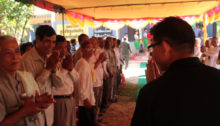 Looking at the media landscape in 2018, it’s very easy to become cynical about the world we live in. Dawn Mikkelson provides something of an antidote to that cynicism with her film Risking Light, which premieres at the Melbourne Documentary Film Festival this Saturday July 14th.
Looking at the media landscape in 2018, it’s very easy to become cynical about the world we live in. Dawn Mikkelson provides something of an antidote to that cynicism with her film Risking Light, which premieres at the Melbourne Documentary Film Festival this Saturday July 14th.
Risking Light is the story of three people from various corners of the world, who have each endured extreme hardships but overcome them through the power of forgiveness.
First of all there is Tasmanian woman Debra Hocking, whose traumatic experiences as a member of the Stolen Generation are hard to fathom. Not only was she unjustly taken away from her family, but also thrust into a foster home where sexual abuse was inescapable. And yet somehow, she can still extend a hand to the nation that failed her.
Then there is Mary Johnson of Minneapolis USA, who has somehow found the strength to forgive the man who murdered her son. More than that, she has chosen to help him grow, teaming up to fight for a better world.
And finally there is Kilong Ung, a Cambodian who fled his nation to escape the horrors of the Khmer Rouge. He now returns to his homeland to find what he has lost, and face the very people who were his persecutors.
Each is an exceptional individual in their own right; a shining example of the potential for human beings to overcome hate in pursuit of a much higher goal. And as easy as it is to write the word ‘forgiveness’, Risking Light makes it clear that achieving it can take a lifetime.
Mikkelson approaches her film without pretension, following each character with unobtrusive handheld camera work that allows us into their lives, juxtaposed with beautifully crafted straight-to-camera interviews. As a filmmaker, she is not afraid of silence, often allowing the viewer to sit introspectively in the moment and contemplate the riddle at the film’s core. What does it mean to forgive?
It’s clear that Dawn Mikkelson is an experienced filmmaker, and a quick look at her oeuvre confirms this. Her career is a litany of powerful documentaries aimed at producing a better world, which is a commendable contribution to the world by any measure. (This Obedience, The Red Tail, Late Life) But Australians can be particularly thankful that she had the opportunity to see Phillip Noyce’s Rabbit Proof Fence (2002), which set her on the path that ultimately led to discovering Debra Hocking’s story.
A special mention should be given to the film score, which acts as a kind of spectral presence in the first half, embodying the sense of trauma and loss that each individual has had to endure, before growing into a quiet and determined forward march towards a brighter future.
Risking Light is about what it means to forgive, but it is also about what it means to earn forgiveness. With each of the three stories Mikkelson gifts to the viewer, it is hard not to feel the burden of responsibility that rests on the perpetrators in each instance. If we are going to make this a better world, we must contemplate the consequences of our actions and learn from the past. That people like Kilung Ung, Debra Hocking and Mary Johnson can overcome is incredible. That they should have to is unacceptable.
Tickets to see Risking Light at the Melbourne Documentary Film Festival are now available.

Comments
2 responses to “Dawn Mikkelson’s Risking Light: Forgiveness in Three Parts”
This looks good, James. I find it very difficult to forgive, and I have held grudges for decades. Maybe watching this film might change my attitude?
Best wishes, Pete.
These three people have forgiven some very big stuff – worth watching!